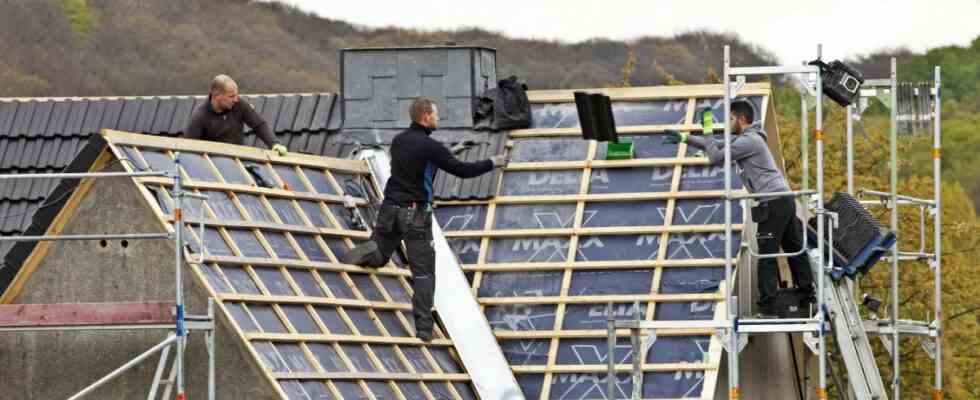If you want to modernize your house or apartment, you have to reckon with significantly less funding from the state. Although more money should flow into comprehensive renovations and individual measures for more energy efficiency, the responsible has communicated to the Federal Ministry of Economics – in each individual case, however, the direct support will sometimes be significantly lower. Depending on the planned conversion, thousands of euros less could flow to the owner.
The state development bank KfW will adjust its development programs as early as Thursday. For example, if an old building was renovated to the level of a so-called efficiency house – better known as the KfW standard – there were loans with a repayment grant of between 25 and 50 percent of the loan amount. Depending on the efficiency standard achieved, this subsidy will now drop to values between five and 25 percent, and gas heating systems will no longer be subsidized at all. There should be an additional bonus if the old building as a so-called Worst Performing Building was among the most inefficient 25 percent of all buildings. In addition, KfW will no longer grant low-interest loans for individual measures and will no longer pay out pure grants. In return, “a significant interest rate reduction will be granted,” it says. The bank has already done this an updated overview of the new funding programs published.
In a second step, funding by the Federal Office of Economics and Export Control (BAFA) is to be changed from August 15th. The authority should then be solely responsible for all individual measures on the buildings, i.e. if only the heating is renewed or the windows are replaced. Here, too, the maximum possible grants are to be reduced and gas heating systems are no longer to receive any funding.
KfW has to change funding rules for the third time this year
It is the third time this year that the federal government has reduced KfW funding at extremely short notice. Initially it was about new buildings, first in January Economics Minister Robert Habeck (Greens) suddenly stopped all applications for the expiring support program for the KfW 55 standard, the successor program for new KfW 40 houses was then largely over in April – just three hours after takeoff. The funds provided had been used up and there was no new money.
This is apparently to be prevented with the urgently needed renovations. Between January and July, renovations and individual measures were funded with 9.6 billion euros, it said. In the future, this subsidy pot is expected to grow to between 12 and 13 billion euros a year – but if the same amount of money were paid out as quickly as last time, that wouldn’t be enough for twelve months either. “In the future, the individual will receive a little less funding than before, but many people can benefit from the funding programs,” said Habeck.
There was still strong criticism of the changes – from all sides. Owners, unions and environmentalists criticized the funding cuts and the short-term changeover. The reform is a “disaster” for climate protection, according to the German Environmental Aid. In view of the enormous increases in material and tradesman costs, it would be fatal for the owners if there was even less money from the state, complained the Haus & Grund association and IG Bau. The Economics Minister wanted the thermostat to be turned down – “at the same time he is turning the screw that makes heating effective,” said union boss Robert Feiger. The GdW, as the association of large landlords, criticized above all the omission of subsidy support for renovations by the KfW, which was “the greatest possible catastrophe” and made climate protection support “unattractive for housing companies,” said association head Axel Gedaschko. Despite the “unnecessary uncertainty”, it remains the same: “It has never been more important and worthwhile to renovate than now,” said Henning Ellermann from the Deneff industry association.
Most of the funding only for renovations
A lot of energy could be saved, especially in the more than 20 million buildings in Germany – a topic that has gained enormous attention due to the Russian attack on Ukraine. In many places there is now concern about having to freeze in winter, after all almost half of all households are heated with gas and their energy consumption has been increasing for years. Last week, Habeck therefore announced a series of new savings targets, including a mandatory “heating check” for all gas burners by spring 2024. In addition, heating systems in apartment buildings in particular are to be made more efficient quickly through so-called hydraulic balancing and modern pumps.
But houses and apartments play an important role not only in the conflict with Russia, but also in climate protection. For years, experts have been warning that the stock must be trimmed to efficiency much faster if Germany wants to achieve the goal it has set itself of being climate-neutral by 2045. According to the estimate, at least two percent of the buildings would have to be renovated every year for this, but recently it was at best one percent. The prospect of soon much higher heating costs could actually ensure more speed.
By far the largest part of the funding, at 12 to 13 billion euros, should therefore continue to flow into renovations in the coming years. According to the plans of the Ministry of Economics, only about one billion would remain for climate-friendly new buildings, here the subsidy should be “largely switched to low-interest loans” and responsibility should be transferred to the Ministry of Construction.

